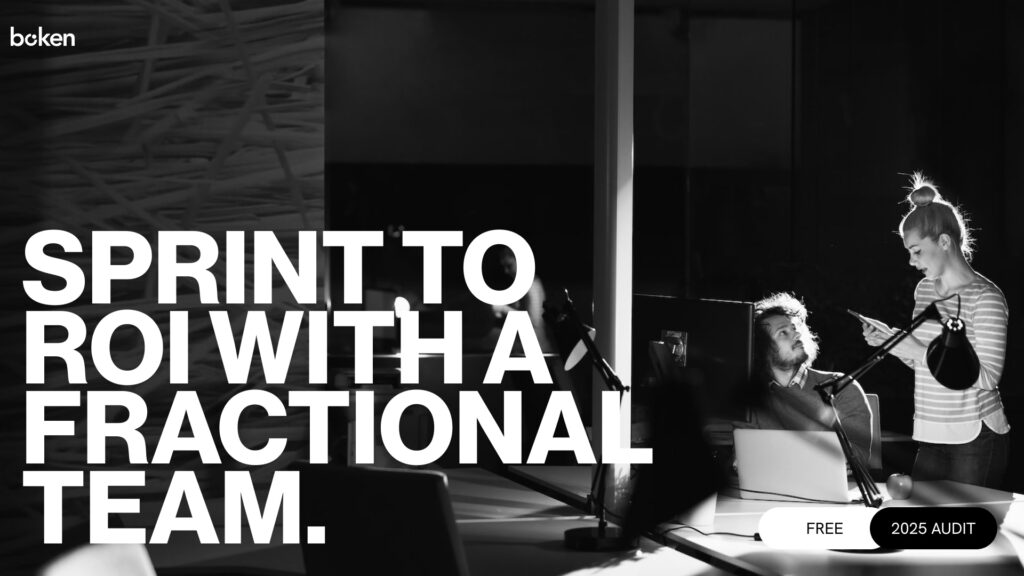When companies bring me in as a Fractional CMO and my team at Boken, they get my absolute best. Why? Because for us, every project is a sprint to ROI and traction. We learn fast, research hard, build efficient messaging, test like crazy, and pivot when necessary. It makes sense for businesses—especially when your runway and bank account demand urgency.
Big brands are catching on. 45% of Fortune 500 companies now use fractional marketing talent for special projects (Source: Forbes). It’s a smart move, and it’s one you should consider. Here’s why.

1. Save Big—Fast
Hiring full-time talent isn’t cheap. Let’s do the math.
A full-time marketing director costs $120,000/year in salary alone. Add benefits, and you’re looking at $156,000/year. But hiring a fractional expert, like me or my team? You can get top-tier strategy and execution for about $96,000/year—that’s $60,000 in savings.
Think about what you could do with that extra money. Launch a new product. Scale your ads? Fractional talent frees up your budget so you can invest where it matters.
2. Get Senior-Level Expertise Without the Commitment
Big brands aren’t hiring just anyone on a fractional basis. They’re bringing in people with decades of experience to solve specific challenges.
Here’s the reality: hiring full-time senior talent means paying for their expertise 40 hours a week—even when you don’t need it. With fractional talent, you only pay for what you use.
For example:
- 60% of fractional CMO hires have more than 15 years of industry experience.
- These aren’t “jack-of-all-trades” hires; they’re specialists who deliver results quickly.
Why it works: You get someone who’s already seen what works (and what doesn’t) at companies just like yours. There’s no ramp-up time. We hit the ground running.
3. Speed + Flexibility = Faster Wins
When you’re scaling or pivoting, speed matters. Hiring fractional talent means no lengthy hiring processes, no training periods, and no HR overhead. You get instant impact.
Stat: Companies using fractional professionals scale 35% faster than those relying only on full-time staff. (Source: Harvard Business Review)
Here’s an example: A business launching a 3-month ad campaign might pay $30,000 for fractional marketing expertise instead of committing to a full-time hire at $15,000/month. The result? The campaign gets off the ground fast, and the company avoids long-term overhead.
4. Niche Expertise for Your Biggest Challenges
Fractional talent gives you access to specialists who live and breathe specific areas—like digital advertising, brand strategy, or analytics. When you need expert help, a fractional pro can step in, crush the task, and move on.
Data point: LinkedIn reports that 70% of fractional professionals specialize in niche areas like AI integration, e-commerce strategy, or performance marketing.
This is where it gets personal. When clients hire me, they get someone who’s obsessed with figuring out what works—and scaling it. I don’t waste time. I zero in on the message, platform, or strategy that’s going to drive results, then we go all-in.
5. Stay Agile—Even in Tough Times
Economic uncertainty doesn’t mean you can’t grow. It just means you have to grow smarter. Fractional talent helps businesses stay flexible, avoid layoffs, and maximize ROI.
Stat: Companies using fractional hiring models reduce operating costs by 25% on average compared to traditional staffing. (Source: Deloitte)
Here’s a budget breakdown:
- Full-time team of 4 marketers: $500,000/year
- Fractional model (2 marketers + fractional expert): $375,000/year
- Savings: $125,000/year
That’s real money back in your pocket—money you can use to weather downturns or double down when the time is right.
Why Fractional Talent Works for Big Brands—and You
Big brands are hiring fractional talent because it works. It’s efficient, cost-effective, and delivers results faster. And it’s not just for them. It’s for startups, small businesses, and companies ready to scale without bloating their payroll.
When you hire someone like me, you get urgency, experience, and a laser focus on ROI. It’s not about showing up for 40 hours a week. It’s about making every hour count.
So, what’s stopping you? The big brands already figured it out. Maybe it’s time you did, too. Let’s talk.
